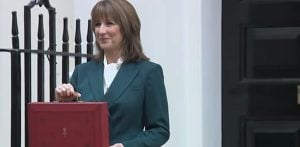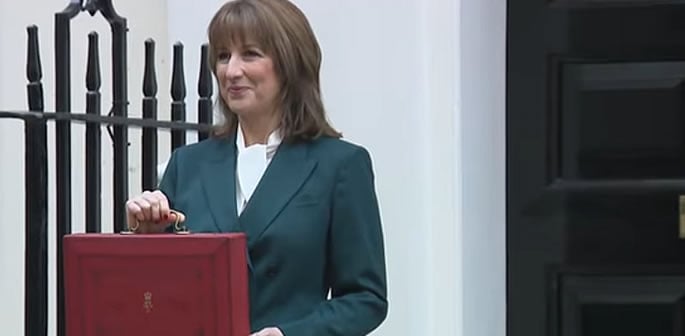the tax thresholds will stay frozen until 2031
Rachel Reeves delivered her long-awaited Budget, giving her statement to MPs in the House of Commons.
It comes after the Office for Budget Responsibility (OBR) mistakenly leaked her plans early as part of its fiscal document, usually published after the Budget.
After the OBR revealed it had reduced expectations for productivity, Ms Reeves, while opening her statement to the House, vowed to “beat the forecasts again”.
“These forecasts are the Tories’ legacy not Britain’s destiny”, she said as she also blamed Brexit and the pandemic.
Here is what the Budget means for you and your money.
You May Pay More Tax
The amount of income at which you pay different rates of income tax will still not be increased in line with rising prices.
Instead, the tax thresholds will stay frozen until 2031, which is three years longer than previously planned.
This means any kind of pay rise could drag you into a higher tax bracket or see a greater proportion of your income taxed than would otherwise be expected. Scotland has its own income tax rates.
You may not earn enough to pay income tax, so VAT, paid when buying goods and services, may hit you harder, and that has been left unchanged.
Driving an EV Will Cost More
Electric vehicle and hybrid car drivers will be taxed for using the road from 2028.
EV drivers will be charged per mile, on top of other road taxes, in new road pricing. However, calculating the number of miles covered will be difficult.
Fuel duty will continue to be frozen for five months from April, followed by a staged increase from September 2026.
You May Get a Pay Rise
Reeves confirmed increases in April 2026 for those on minimum wages. Eligible workers aged 21 and over on the National Living Wage will receive £12.71 an hour, up from £12.21.
If you are aged 18, 19 or 20, the National Minimum Wage will increase to £10.85 an hour, up from £10. For those aged 16 or 17, the minimum wage will rise to £8 an hour, up from £7.55.
The separate apprentice rate, which applies to eligible people under 19 or those over 19 in the first year of an apprenticeship, will also increase to £8 an hour, from £7.55.
Some Homeowners will Pay More Tax
Anyone who lives in a home valued at £2 million or more in England will face a council tax surcharge from April 2028.
There will be four price bands, with the surcharge rising from £2,500 for a property valued in the £2 million to £2.5 million band to £7,500 for a property valued in the highest band of £5 million or more.
While known as a mansion tax, it may also capture homes in expensive areas and will be levied on about 100,000 properties, primarily in London and south-east England.
The move will require the valuation of homes in the top council tax bands, F, G and H, for the first time since 1991.
You can check your council tax band here if you are in England and Wales, Scotland and Northern Ireland.
Train Fares in England Won’t Increase
Regulated rail fares in England will be frozen until March 2027, the first time they have been left unchanged for 30 years.
These fares include season tickets covering most commuter routes, some off-peak return tickets on long-distance journeys and flexible tickets for travel in and around major cities.
The freeze only relates to travel in England and applies only to services run by England-based train operating companies.
Train operators are free to set prices for unregulated fares. The bus fare cap of £3 for a single journey, covering most bus journeys in England, is already in place until March 2027.
Cash ISA Savings will be Restricted
The amount of money that can be saved tax-free each year in a cash ISA will be reduced from £20,000 to £12,000 a year for the under-65s.
Ministers want people to invest more, which comes with greater risk but could help boost growth, a key government objective.
There are questions over whether people would naturally put their money into stocks and shares ISAs as a result of the less generous tax break on cash ISAs.
About a quarter of those who save money into a cash ISA currently save more than £12,000 a year.
Many of those are pensioners, and the chancellor said the over-65s will still be able to save up to £20,000 in cash.
Separately, the Help to Save scheme, which helps those on low incomes and on universal credit to put money aside, will be extended from 2028.
Larger Families could Get More Money
At present, parents can only claim universal credit or tax credits for their first two children.
The chancellor says this two-child cap will be scrapped in April 2026.
That means many thousands of parents with three or more children will receive more in universal credit and tax credits.
Work Pension May Be Affected
A third of private sector employees and a tenth of public sector workers use a salary sacrifice scheme for their pension savings.
These workers give up a portion of their salary in return for their employer paying the equivalent amount into their pension.
The benefit to both employer and employee is that they make savings in national insurance.
A £2,000-a-year cap on the amount that can be put into pensions through this salary sacrifice arrangement will be in place from April 2029. More can be put in, but it will be taxed.
Employees would still get income tax relief on their pension contributions, but some argue the move will reduce pension saving incentives.
Most benefits & State Pension will Rise
Some benefits, including all the main disability benefits such as personal independence payment, attendance allowance and disability living allowance, as well as carer’s allowance, will rise by 3.8% in April, in line with rising prices.
There will be a string of changes to universal credit in April, following earlier government announcements.
The state pension in April will rise by 4.8% in line with average wages.
The new flat-rate state pension will increase to £241.30 a week, or £12,547.60 a year, a rise of £574.60. The old basic state pension will go up to £184.90 a week, or £9,614.80 a year, a rise of £439.40.
In general, you need 35 years of qualifying contributions to get a full state pension.
This brings the state pension closer to being subject to income tax, a source of debate. It will also reignite discussions over the fairness of the so-called triple lock.
Prescription Charges Frozen & Motability Changes
A range of other measures in the Budget had already become clear or been announced.
The UK tax on fizzy drinks will be extended to milk-based products in 2028, taking in pre-packaged milkshakes and coffees that are high in sugar. This may push up prices or lead to ingredient changes.
The cost of a single NHS prescription in England will be frozen at £9.90 for the second year in a row in April.
Disabled people who have a car through the Motability scheme will no longer be allowed premium vehicles such as BMWs, Mercedes, Audi, Alfa Romeo and Lexus.
England’s mayors could be given the powers to charge a levy on overnight stays, sometimes referred to as a tourist tax.
Mayors would decide the level of the charge and how to spend the money in their areas under the plans, which will be consulted upon.
The Budget’s measures will filter into everyday life in different ways, from the tax you pay to the support you receive and the choices you make about saving or spending.
Some households will feel the strain sooner than others, while a few may see modest gains.
What is clear is that these decisions will shape how far people’s money goes, and many will now be working out what the changes mean for their own budgets.






























































